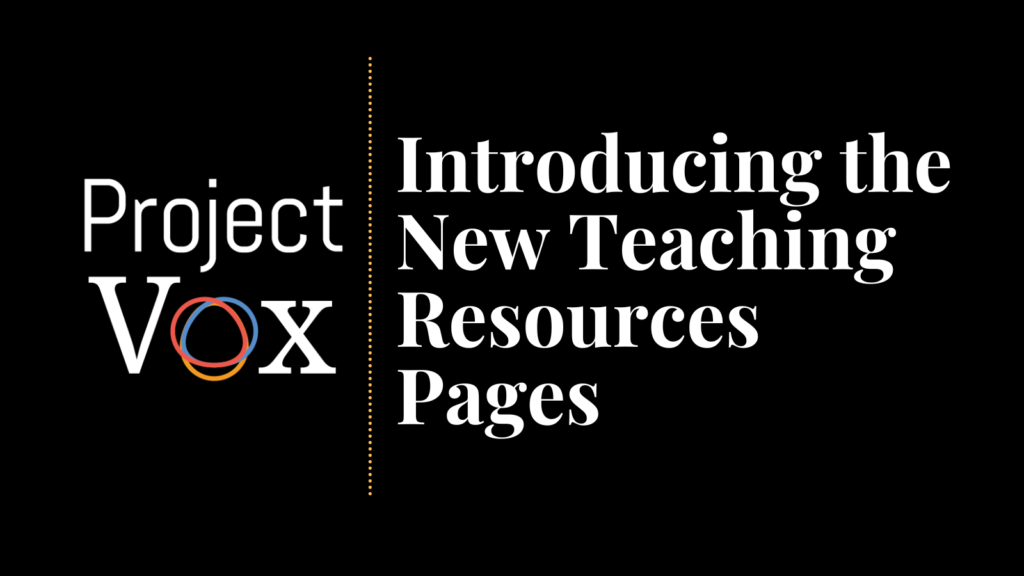This post addresses our revised Teaching Page by Emilie Menzel, Teaching Resources Analyst.
We are delighted to announce the results of what has been a year long endeavor: assessing and updating the teaching resources page on our Project Vox website. Project Vox has supported the collection and publication of philosophy course syllabi for nearly two decades as a side project to creating new philosopher entries. The teaching resources page was (and is) filled with syllabi and teaching materials on early modern women philosophers, which offer instructors course structure, topic organization, assignment, and reading list recommendations. The team had received strong anecdotal feedback from philosophy instructors that these resources were useful for building more women philosophers into their courses. The teaching resources page as it stood a year ago, however, was due for a refresher: the design felt static and text heavy, organization was a bit haphazard, and the syllabi were not easily searchable. The team was also exploring broader questions about the possibilities for the teaching resources. For example, were the syllabi being used? What do professors need to support bringing more women philosophers into their curricula? What changes could be made to the teaching resources that would still be sustainable to the team? It was time for an update to ensure that the teaching resources remained useful and accessible.
You’ll remember that this past winter we asked you, our community, to share your experiences with teaching women philosophers by completing a brief survey. We asked you to share on topics like whether you have used Project Vox in teaching, what teaching resources you would like to see on early modern women philosophers, if you have encountered barriers to teaching women philosophers, and what resources would be helpful for overcoming these barriers. Your responses were generously detailed, supportive, and full of ideas. Here are key takeaways we gathered from your feedback:
- Of respondents who had used Project Vox in instruction, 78% of you had used Project Vox as a guide in syllabus construction, 67% in creating lesson plans, 39% for assigned supplemental reading and reference materials, and 17% in creating class assignments.
- 70% of surveyed instructors had experienced obstacles incorporating non-canonical philosophers into courses. Your obstacles included difficulty finding relevant texts, finding student accessible texts and translations, and not knowing where to look for information on the subject.
- You noted needs for free and accessible readings, for specific reading suggestions, for reading excerpt suggestions, and for relevant readings organized by philosophy theme.
- You indicated interest in seeing Project Vox share additional syllabi, reading pairing recommendations (e.g. read Princess Elisabeth with Descartes), and discussion questions.
This spring, we used the responses you shared to shape the organization, design, and future content of our philosophy teaching resources. You’ll see the once solitary teaching resources page has been expanded into three, with a more dynamic design and improved search capabilities tailored specifically to philosophy instruction. Here are several of the features we are excited to share with you:
Find Reading Suggestions:
As per your requests, we focused on organizing our resources in a way that would allow you to more easily locate relevant and student accessible reading recommendations. To this end, you can now search all syllabi and other teaching materials on our website by included philosophers, target reading audience, and philosophy conversations.
Reading Pairing Recommendations:
Our team has gathered recommendations for philosopher pairings: philosophers to read in combination with Project Vox philosophers. Further, you can search for Project Vox philosophers based on their engaged philosophy discipline areas (e.g. Ethics, Epistemology) and themes (e.g. Human Nature, Freedom). We hope this tool can give you additional ideas for how to integrate women philosophers into your courses and assist you in finding approachable entry points around your already existing curriculum.
Search Syllabi by Course Structure:
Different classrooms have different curriculum constraints and varying levels of flexibility in what the professor is allowed to teach. Our aim is to support teachers across these settings in integrating women philosophers. We’ve thus created a way for you to sort the sample syllabi by their “syllabus approach” to integrating women. Syllabi marked with the approach “Adds Women” are particularly useful for ideas on how to integrate women into traditional courses where you are not allowed much variability from a classic canonical curriculum. Syllabi marked with “Centers Women” are useful for thinking about how to significantly restructure your course to feature women philosophers.
More Teaching Material Types:
You’ll notice that included in the redesign of the teaching resources is an expansion of the types of available teaching materials. In addition to syllabi, you can now explore a budding collection of data visualizations, class assignments, and more. We’ve worked hard to create a way of organizing, sharing, and maintaining the teaching materials that can expand in the future to match your interests and needs.
Search Suggestions:
The new teaching resources pages use embedded Airtables to help store and organize the teaching materials. If the interface of these tables has you a bit overwhelmed, be sure to check the bottom of each resource page for tips on suggested searches and step by step instructions on how to carry out those searches.
We know that redefining the canon in the classroom takes hard work. In this teaching resources redesign, we have aimed to organize and expand the materials we have available in a way that creates more entry points for bringing women into your classrooms. By organizing the resources in a way particular to philosophy classroom needs, we hope you can more easily find connection points between what you are already teaching and these incredible women philosophers, allowing you to more easily expand and adjust your courses for diversity. We hope you enjoy exploring the new teaching resources wing of the Project Vox website.
Interested in sharing your own teaching materials with Project Vox? You can find more information about that process on our teaching resources landing page.







